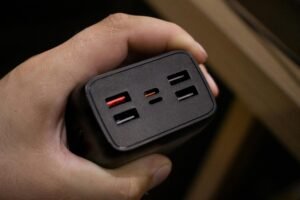Wondering if wireless fast charging is safe for your phone’s battery? Experts weigh in on potential risks, myths, and best practices to keep your device in top shape.
📢 Introduction
Have you ever left your phone on a wireless charger overnight and wondered, “Is this killing my battery?” You’re not alone! Wireless fast charging is super convenient, but many people worry about whether it affects battery life, causes overheating, or even poses safety risks.
So, is wireless fast charging safe? Let’s break down the myths, facts, and expert opinions so you can charge your devices worry-free!
🔋 How Does Wireless Fast Charging Work?
Wireless charging is based on Qi (pronounced ‘chee’) technology, which uses electromagnetic induction to transfer power from the charger to your phone—without needing a cable!
⚡ Wired vs. Wireless Fast Charging: Key Differences
| Feature | Wired Fast Charging | Wireless Fast Charging |
|---|---|---|
| Charging Speed | Faster (up to 100W) | Slower (max ~50W) |
| Heat Generation | Less heat | More heat |
| Convenience | Requires plugging/unplugging | Just place on a pad |
| Energy Efficiency | More efficient (~85%) | Less efficient (~75%) |
While wireless fast charging is slightly less efficient than wired, newer chargers are getting better at minimizing heat and energy loss.
🌡️ Can Wireless Fast Charging Damage Your Battery?
One of the biggest concerns people have is battery degradation. Here’s what experts say:
- Fast charging does NOT directly damage your battery, but it does cause more heat, which can contribute to wear over time.
- Most modern phones have built-in safety features that prevent overheating and overcharging.
- Battery lifespan is measured in charge cycles (typically 500-800 full cycles). The more you charge, the faster the battery degrades—regardless of charging method.
🤔 Does Heat Affect Battery Life?
Yes! Heat is the #1 factor in battery wear. Lithium-ion batteries are sensitive to high temperatures, which can reduce battery capacity over time.
⚠ Temperature Impact on Battery Health
| Temperature | Effect on Battery Life |
| 0-30°C (32-86°F) | Ideal charging range |
| 30-40°C (86-104°F) | Slight degradation over time |
| 40°C+ (104°F+) | Accelerated battery wear |
Tip: If your phone feels hot while charging, remove the case or move it to a cooler spot!
🤔 Wireless Fast Charging vs. Wired Charging: Which One is Safer?
Both methods are safe when using certified chargers, but there are some differences:
🛡️ Safety Comparison
| Safety Factor | Wireless Fast Charging | Wired Fast Charging |
| Heat Generation | More heat | Less heat |
| Risk of Overcharging | Low (smart chips prevent it) | Low |
| Fire Hazard | Low (if using certified chargers) | Low |
✅ Verdict: Wireless fast charging is just as safe as wired charging if you use a high-quality charger and avoid excessive heat.
🕵️♂️ Common Myths About Wireless Fast Charging
Let’s bust some common myths!
- Myth: Wireless charging is always slower.
✅ Fact: Newer fast chargers (like 15W+ MagSafe) are almost as fast as wired charging. - Myth: Wireless charging overheats your phone.
✅ Fact: Quality chargers have heat management features, and most phones auto-regulate temperature. - Myth: Wireless charging shortens battery life.
✅ Fact: Heat affects battery life more than charging method. Wired fast charging generates heat too! - Myth: You can’t use your phone while wirelessly charging.
✅ Fact: You can, but it may slow charging due to interrupted contact.
🎮 Best Practices to Keep Your Phone Safe While Using Wireless Fast Charging
To keep your battery in top shape, follow these expert-approved tips:
1. Use a High-Quality Qi-Certified Charger
- Brands like Anker, Belkin, and Mophie are reliable.
- Avoid cheap, uncertified chargers—they can overheat and degrade your battery!
2. Avoid Charging in Hot Environments
- Don’t leave your phone on a charger in direct sunlight or near heat sources.
3. Charge in Short Bursts, Not Overnight
- Keeping your battery between 20-80% helps extend battery life.
- Overnight charging won’t ruin your battery, but it’s not ideal long-term.
4. Remove Thick Cases While Charging
- Some thick or metal-backed cases block charging efficiency and cause extra heat.
🔮 The Future of Wireless Fast Charging and Safety Improvements
Wireless charging is evolving fast!
- Faster Charging Speeds: New 50W+ wireless chargers are hitting the market.
- Better Heat Management: New materials like graphene-based chargers help reduce heat.
- Over-the-Air Charging: Companies like Xiaomi and Energous are working on true wireless charging (no pad needed!).
🎉 Conclusion
So, is wireless fast charging safe? YES! As long as you: ✅ Use a high-quality Qi-certified charger ✅ Avoid extreme heat while charging ✅ Follow best practices like short bursts instead of overnight charging
Wireless fast charging is super convenient and safe, and future improvements will make it even better! What’s your experience with wireless charging? Drop your thoughts in the comments! 💭🚀




